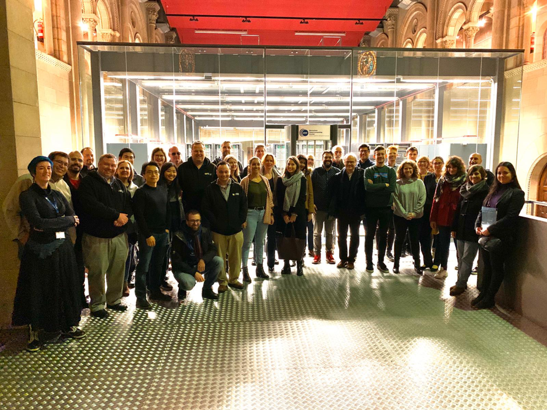Study-a-thons: fast-tracking healthcare research (Guest blog)
19.02.20
It’s clear that the need for real world data (RWD) to generate real world evidence (RWE) has been increasing and will continue to do so. And while progress is being made in creating federated data- sharing networks and new tools that standardise and harmonise health data research, it can still take many months and even years to analyse this RWD and generate the RWE that can ultimately significantly improve patient care.


Study-a-thon participants, Barcelona, January 2020
This is where the study-a-thon is proving to be such a successful formula by speeding up this entire research process. It’s a simple concept: bring together a comprehensive and diverse range of experts and have an uninterrupted deep-dive on a specific disease for a solid five days.
A recent example of this occurred in Barcelona in January at an EHDEN (European Health Data & Evidence Network) - OHDSI (Observational Health Data Sciences & Informatics) event, which brought together forty RA (rheumatoid arthritis), epidemiology and data science experts from academia and industry. They came from ten different countries to collaboratively design and execute three observational studies; interpret the clinical findings; and disseminate the results through European League Against Rheumatism (EULAR) abstracts and publications.
The week consisted of a daily combination of didactic lecture and interactive demonstrations of the OHDSI tools and practices, a group review of results shared by data partners, and topic-specific breakouts for collaboratively making design decisions, writing protocols and manuscripts. As such, a study-a-thon is an excellent opportunity for experts to familiarise themselves with the OHDSI research framework and standardised analytics.
Collectively across the participants, we had access to fourteen different international observational databases across three continents with health data from RA patients. As a team, they created a phenotype definition for rheumatoid arthritis and characterised the populations across all of these databases. In aggregate, we had assembled over 1.1 million patient records with RA, making this work the largest set of studies ever conducted in rheumatology!
The overall feedback from the event was tremendously positive from all participants. Most agreed that the quality of the research was as good or better than would have been achieved through traditional means and the depth of findings across such a breadth of disparate data was unprecedented and couldn't have been done by any one organisation alone - let alone in only one week!
In addition to the study-a-thon findings, the meeting also served as a great example of the strong spirit of collaboration that is so vital to the success of smarter data sharing and the creation of federated networks such as EHDEN. The group eagerly agreed to use this event as the springboard to establish an OHDSI-RA community to continue future collaborations, with a strong desire to hold study-a-thons in the future to tackle new questions of shared interest.
For more information about EHDEN and this study-a-thon, visit our website or contact me.
Click here to view brief interviews with the study-a-thon participants.
The European Health Data & Evidence Network has received funding from the Innovative Medicines Initiative 2 Joint Undertaking (JU) under grant agreement No 806968. The JU receives support from the European Union’s Horizon 2020 research and innovation programme and EFPIA.
